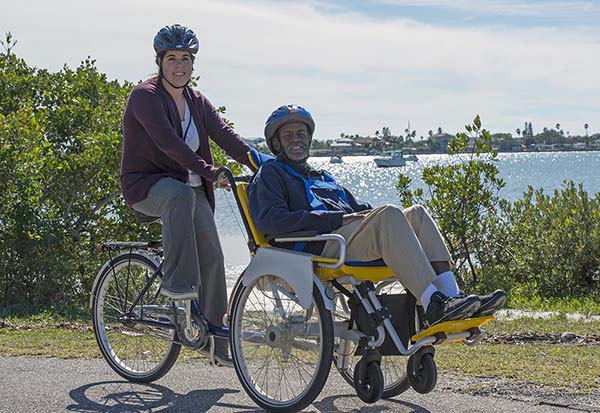Becoming a recreational therapist can be an incredibly rewarding career choice for those who want to help others improve their quality of life. As a recreational therapist, you will work with individuals who have physical, emotional, or mental disabilities to help them develop and maintain leisure skills that can improve their overall well-being.
Recreational therapists also help patients learn to cope with their disabilities and develop social skills that can improve their relationships with others.
To become a recreational therapist, you will need to obtain a bachelor’s degree in recreational therapy or a related field. Some states also require that you obtain licensure or certification before you can practice as a recreational therapist.
In addition to formal education, you will need to have strong interpersonal skills, be able to work well in a team, and have a passion for helping others. If you are interested in pursuing a career in recreational therapy, there are many resources available to help you get started on the path to success.
Understanding Recreational Therapy
Recreational therapy is a form of therapy that utilizes leisure activities to improve the physical, mental, emotional, and social well-being of individuals with disabilities or illnesses. As a recreational therapist, you will work with individuals of all ages and backgrounds to help them achieve their goals and improve their quality of life.
The goal of recreational therapy is to help individuals develop skills, knowledge, and behaviors that will enable them to participate in leisure activities and improve their overall quality of life. Recreational therapists use a variety of activities, such as sports, games, arts and crafts, music, and dance, to help individuals achieve their goals.
Recreational therapy is often used in conjunction with other forms of therapy, such as physical therapy, occupational therapy, and speech therapy. It can be used to treat a wide range of conditions, including physical disabilities, mental illness, substance abuse, and developmental disabilities.
As a recreational therapist, you will work closely with your clients to develop individualized treatment plans that address their unique needs and goals. You will also work with other healthcare professionals, such as doctors, nurses, and social workers, to ensure that your clients receive the best possible care.
Educational Requirements
High School Preparation
Before you can enroll in a bachelor’s degree program, you will need to have a high school diploma or equivalent. While in high school, you can prepare for a career in recreational therapy by taking courses in biology, psychology, and health education. Volunteer work or internships in hospitals or other healthcare settings can also help you gain experience and knowledge.
Bachelor’s Degree
To become a recreational therapist, you will need to earn a bachelor’s degree in recreational therapy or a related field such as psychology or therapeutic recreation. These programs typically take four years to complete and include coursework in anatomy and physiology, psychology, human development, and therapeutic interventions. Some programs also require students to complete a certain number of clinical hours.
Master’s Degree
While a bachelor’s degree is the minimum requirement for entry-level positions in recreational therapy, some employers prefer or require candidates to have a master’s degree. A master’s degree in recreational therapy or a related field can help you gain advanced knowledge and skills in areas such as program development, research, and administration. These programs typically take two years to complete and may include a thesis or capstone project.
To become a recreational therapist, you will need to have at least a bachelor’s degree in recreational therapy or a related field. Some employers may prefer or require candidates to have a master’s degree. During your education, you can prepare for this career by taking relevant courses, gaining experience through internships or volunteer work, and completing clinical hours.
Certification and Licensing
Certified Therapeutic Recreation Specialist
To become a recreational therapist, you will need to obtain the Certified Therapeutic Recreation Specialist (CTRS) credential. This certification is offered by the National Council for Therapeutic Recreation Certification (NCTRC). To be eligible for the CTRS exam, you must have a bachelor’s degree or higher in recreational therapy or a related field, such as leisure studies or therapeutic recreation.
Once you have met the education requirements, you can apply to take the CTRS exam. The exam consists of 150 multiple-choice questions and covers topics such as assessment, treatment planning, and program implementation. You must score at least 70% to pass the exam.
State Licensing
In addition to obtaining the CTRS credential, many states require recreational therapists to be licensed. Licensing requirements vary by state, but typically include completing an accredited educational program, passing a state exam, and completing a certain amount of supervised work experience.
It is important to research the licensing requirements in your state to ensure that you meet all of the necessary qualifications. Some states may also require continuing education to maintain your license.
Obtaining the CTRS credential and state licensing are important steps in becoming a qualified recreational therapist. These credentials demonstrate that you have the knowledge and skills necessary to provide effective therapeutic services to your clients.
Skills and Qualities Needed
Interpersonal Skills
As a recreational therapist, you will be working with people from different backgrounds and age groups. You need to have excellent interpersonal skills to establish a good rapport with your clients and their families. You must be able to communicate effectively, listen actively, and show empathy towards your clients. You should also be able to work collaboratively with other healthcare professionals to provide the best care possible.
Patience
Recreational therapy involves working with people who have physical, emotional, or cognitive challenges. You need to have patience and be able to work at the client’s pace. You should be able to provide support and encouragement to your clients, even when progress is slow. You must also be able to handle difficult situations calmly and professionally.
Creativity
Recreational therapy involves developing and implementing activities that are engaging and fun for your clients. You need to have creative ideas and be able to adapt activities to meet the individual needs of your clients. You should be able to think outside the box and come up with innovative solutions to challenges that arise.
Physical Stamina
Recreational therapy involves physical activities, such as sports, games, and outdoor activities. You need to have physical stamina to keep up with your clients and participate in activities with them. You should also be able to lift and move equipment, set up activities, and perform other physical tasks as needed.
Career Path and Progression
Entry Level Positions
To become a recreational therapist, you will typically need to have a bachelor’s degree in recreational therapy or a related field. Entry-level positions for recreational therapists may include working as a recreational therapy assistant or as a recreational aide. These positions typically involve working under the supervision of a licensed recreational therapist and assisting with the planning and implementation of recreational activities for patients.
As a recreational therapy assistant or aide, you may be responsible for organizing and leading activities such as arts and crafts, sports, and games. You may also be responsible for documenting patient progress and communicating with other healthcare professionals about patient needs.
Career Advancement Opportunities
As you gain experience and knowledge in the field of recreational therapy, there are a number of career advancement opportunities available to you. One option is to pursue a master’s degree in recreational therapy or a related field. With a master’s degree, you may be eligible for higher-level positions such as a recreational therapist supervisor or program director.
Another option for career advancement is to specialize in a particular area of recreational therapy. For example, you may choose to specialize in working with children or older adults, or you may focus on a specific type of therapy such as music or art therapy.
Additionally, you may have the opportunity to move into a leadership role within your organization. This could involve managing a team of recreational therapists or overseeing the development and implementation of recreational therapy programs across multiple locations.
The field of recreational therapy offers a variety of career paths and opportunities for growth and advancement. With the right education, experience, and dedication, you can build a successful and fulfilling career as a recreational therapist.
Conclusion
Becoming a recreational therapist can be a rewarding career choice if you enjoy helping people and have a passion for recreational activities. Throughout this guide, you have learned about the necessary education, skills, and certifications required to become a recreational therapist.
If you are interested in pursuing a career as a recreational therapist, we encourage you to research educational programs, gain experience through internships or volunteer work, and obtain the necessary certifications to become a qualified and competent professional in this field.


